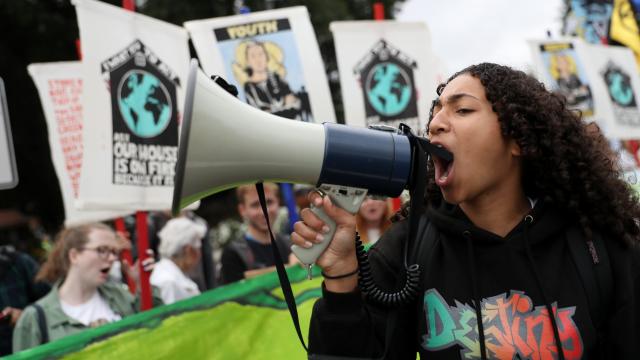On Tuesday, Reuters scored an exclusive interview with Ben van Beurden, the CEO of the Shell Oil Company. During the sitdown, he decried people demonising oil and said it’s “entirely legitimate to invest in oil and gas because the world demands it” and that “we have no choice” but to keep investing in dirty fossil fuel exploration.
Van Beurden’s remarks are, to put it in no uncertain terms, climate denialism. But because he said he defended the legitimacy of oil in response to “activists” claims, his comments are also a sign of something else: that the new, global outburst of climate rage is working.
In recent years, oil has felt like an inevitability. The global economy runs on it, and companies that extract it turn billions of dollars in profits while reaping trillions in direct and indirect subsidies from governments. It’s how the world has worked, and it felt like it was a permanent part of life.
But the new wave of climate activism has punctured that cocoon of inevitability. Where once there were protests, now there are strikes and open rebellion against the status quo. That’s not to say the decades of protests by Greenpeace, the Sierra Club and countless global environmental justice groups haven’t amounted to anything. They’re the foundation on which the current climate movement is built, and they kept the focus on the climate crisis at a time when public interest was somewhere between “meh” and “huh.”
In the past year, though, things have dramatically shifted. The influence of climate change has been more clearly on display as our weather goes haywire. And a series of terrifying reports have shown how close to the edge fossil fuels have pushed the climate while making a timeframe for action clear. It’s in part this staid science that has injected a newfound rage into climate activism.
Journalist Amy Westervelt eloquently made the case for climate rage earlier this year in an article I can’t get out of my head. In it, she wrote that “[t]he story of climate change, both its history and its future, needs to be told by people who have already experienced injustice and disempowerment, people who are justifiably angry at the way the system works.” And climate activism in 2019 looks like a lot like the story Westervelt says should be told as frontline communities and teenagers have risen to the forefront, from Standing Rock to Sweden.
Listen to teen activist Greta Thunberg and the millions of students who have followed her into the streets, and the anger is palpable. So are the targets of that anger.
While they see governments as having a responsibility to act ” and there is rightful indignation at the decades of sleepwalking that have preceded this moment ” the most powerful anger has been directed at the fossil fuel industry and the damage it continues to cause to the climate and vulnerable communities. These companies have stolen their future.
There have been other avenues of pressure on the fossil fuel industry, from lawsuits to the falling cost of renewables to the increasingly clear impacts of climate change in the form of more intense wildfires, hurricanes, and even just the rising tides of sunny-day floods. But the rage is what has changed the game.
That Shell’s CEO felt compelled to address activists’ concerns (which are fully backed by science) is a sign of the fractures to come. And van Beurden is far from alone. Earlier this year, the secretary-general of OPEC labelled the climate strike movement the “greatest threat” to the fossil fuel industry. Greta, true to teenage form, tweeted that it was the “biggest compliment yet” for activists’ work. Shell’s CEO denigrating the demands to wind down fossil fuel production is another compliment, if unintended, that the pressure is working.
At last year’s international climate talks in Poland, Shell’s chief climate advisor boasted the company was instrumental in getting language about carbon markets into the Paris Agreement.
Student activists, including Thunberg, also overran the conference and shut down an official U.S. event promoting fossil fuels. In the year since, rage has continued to build, and next month’s iteration of the climate talks will be a chance to see if world leaders have caught on yet.
